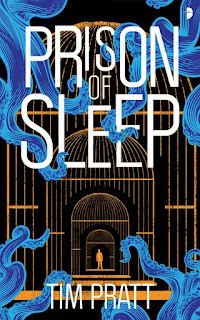 among others. He is the author of over twenty novels, including The Deep Woods and Heirs of Grace, and scores of short stories. His work has been reprinted in The Best American Short Stories, The Year's Best Fantasy, The Mammoth Book of Best New Horror, and other nice places. Since 2001 he has worked for Locus, the magazine of the science fiction and fantasy field, where he currently serves as senior editor. He lives in Berkeley, CA with his wife and son.
among others. He is the author of over twenty novels, including The Deep Woods and Heirs of Grace, and scores of short stories. His work has been reprinted in The Best American Short Stories, The Year's Best Fantasy, The Mammoth Book of Best New Horror, and other nice places. Since 2001 he has worked for Locus, the magazine of the science fiction and fantasy field, where he currently serves as senior editor. He lives in Berkeley, CA with his wife and son.
Pratt's new novel is Prison of Sleep: Book II of the Journals of Zaxony Delatree.
Recently I asked the author about what he was reading. Pratt's reply:
I enjoyed a couple of the Harlan Coben adaptation shows on Netflix, and had never read any of his books, so I went to my library site and picked up what they had on hand. That turned out to be mostly the Myron Bolitar series, so I read those (and the newish spin-off, Win, about one of the supporting characters), about a dozen books in all. I love long-running private-eye series (in this case a quasi-amateur PI; Myron is a sports agent with a small background in investigation who gets entangledVisit Tim Pratt's website.in various sorts of criminal complications). The structure of standalone stories with ongoing character development across the series always delights me.
The Platonic ideal of the long-running private-eye series, of course, is Robert B. Parker's Spenser series, and the Bolitar books are clearly inspired by those. Myron's humor is very similar to Spenser's, they both have the "pet psychopath" trope with Win and Hawk respectively (I love that trope), there's a focus on idealized romantic love crashing up against human foibles, there's a colorful cast of characters including oddball secondary antagonists who later become allies (Zorra in the Bolitar books is admittedly weirder than Vinnie in the Spenser novels but they serve exactly the same function across their series)... there are a lot of similarities, structurally and in tone.
The Spenser books are, however, better; they have greater philosophical and psychological depth, better fight scenes, and the humoris less broad and deals less in stereotypes. Some of the stuff in the Bolitar books didn't age well, though in the later volumes the characters evolve in their thinking, and I will note there were always sympathetic characters who were bisexual and kinky and otherwise out of the mainstream, though those qualities were often played for laughs in a way that made me wince.
The Bolitar books are Spenser-lite, but they're still fun and compulsively readable enough that I got through the series in a month. They scratched a similar itch, and since there isn't any more Spenser coming (posthumous "collaborations" notwithstanding), I was happy to have them.
--Marshal Zeringue




